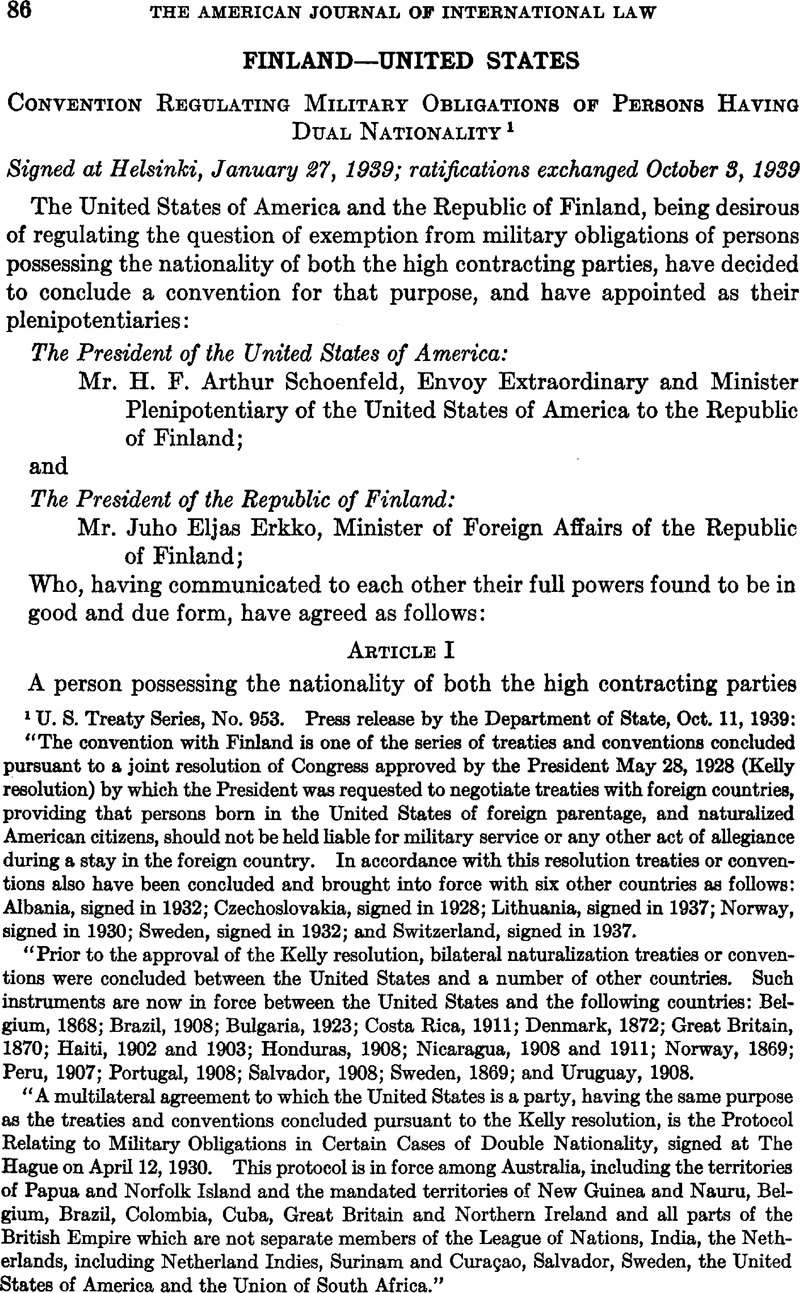No CrossRef data available.
Published online by Cambridge University Press: 12 April 2017

U. S. Treaty Series, No. 953. Press release by the Department of State, Oct. 11, 1939:
“The convention with Finland is one of the series of treaties and conventions concluded pursuant to a joint resolution of Congress approved by the President May 28, 1928 (Kelly resolution) by which the President was requested to negotiate treaties with foreign countries, providing that persons born in the United States of foreign parentage, and naturalized American citizens, should not be held liable for military service or any other act of allegiance during a stay in the foreign country. In accordance with this resolution treaties or conventions also have been concluded and brought into force with six other countries as follows: Albania, signed in 1932; Czechoslovakia, signed in 1928; Lithuania, signed in 1937; Norway, signed in 1930; Sweden, signed in 1932; and Switzerland, signed in 1937.
“Prior to the approval of the Kelly resolution, bilateral naturalization treaties or conventions were concluded between the United States and a number of other countries. Such instruments are now in force between the United States and the following countries: Belgium, 1868; Brazil, 1908; Bulgaria, 1923; Costa Rica, 1911; Denmark, 1872; Great Britain, 1870; Haiti, 1902 and 1903; Honduras, 1908; Nicaragua, 1908 and 1911; Norway, 1869; Peru, 1907; Portugal, 1908; Salvador, 1908; Sweden, 1869; and Uruguay, 1908.
“A multilateral agreement to which the United States is a party, having the same purpose as the treaties and conventions concluded pursuant to the Kelly resolution, is the Protocol Relating to Military Obligations in Certain Cases of Double Nationality, signed at The Hague on April 12, 1930. This protocol is in force among Australia, including the territories of Papua and Norfolk Island and the mandated territories of New Guinea and Nauru, Belgium, Brazil, Colombia, Cuba, Great Britain and Northern Ireland and all parts of the British Empire which are not separate members of the League of Nations, India, the Netherlands, including Netherland Indies, Surinam and Curacao, Salvador, Sweden, the United States of America and the Union of South Africa.”
1 U. S. Treaty Series, No. 953. Press release by the Department of State, Oct. 11, 1939:
“The convention with Finland is one of the series of treaties and conventions concluded pursuant to a joint resolution of Congress approved by the President May 28, 1928 (Kelly resolution) by which the President was requested to negotiate treaties with foreign countries, providing that persons born in the United States of foreign parentage, and naturalized American citizens, should not be held liable for military service or any other act of allegiance during a stay in the foreign country. In accordance with this resolution treaties or conventions also have been concluded and brought into force with six other countries as follows: Albania, signed in 1932; Czechoslovakia, signed in 1928; Lithuania, signed in 1937; Norway, signed in 1930; Sweden, signed in 1932; and Switzerland, signed in 1937.
“Prior to the approval of the Kelly resolution, bilateral naturalization treaties or conventions were concluded between the United States and a number of other countries. Such instruments are now in force between the United States and the following countries: Belgium, 1868; Brazil, 1908; Bulgaria, 1923; Costa Rica, 1911; Denmark, 1872; Great Britain, 1870; Haiti, 1902 and 1903; Honduras, 1908; Nicaragua, 1908 and 1911; Norway, 1869; Peru, 1907; Portugal, 1908; Salvador, 1908; Sweden, 1869; and Uruguay, 1908.
“A multilateral agreement to which the United States is a party, having the same purpose as the treaties and conventions concluded pursuant to the Kelly resolution, is the Protocol Relating to Military Obligations in Certain Cases of Double Nationality, signed at The Hague on April 12, 1930. This protocol is in force among Australia, including the territories of Papua and Norfolk Island and the mandated territories of New Guinea and Nauru, Belgium, Brazil, Colombia, Cuba, Great Britain and Northern Ireland and all parts of the British Empire which are not separate members of the League of Nations, India, the Netherlands, including Netherland Indies, Surinam and Curacao, Salvador, Sweden, the United States of America and the Union of South Africa.”